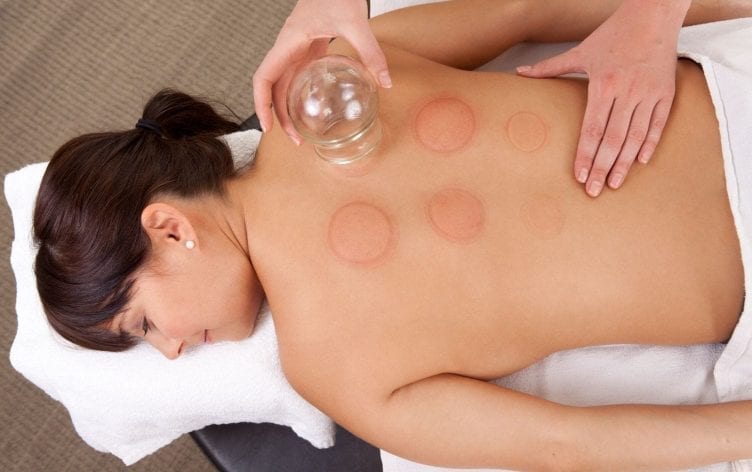
Is Cupping the New Foam Roller
Cupping is an ancient medicinal technique used all over the world for thousands of years to treat everything from bronchitis to arthritis to acne. Athletes and sports medicine practitioners have started using cupping to recover better from workouts and treat injuries.
WHAT IS CUPPING?
You may have noticed athletes at the Olympics, in yoga class or walking through the airport with medium-to-large circular bruises on their bodies, most commonly along the spine or shoulders — looking like they got attacked by a giant octopus.
These bruises are from the suction created by cupping. Cupping is a technique in which glass, plastic or silicon cups are placed on the skin when someone is sore or experiencing pain. The vacuum created within the cup pulls the skin and fascia away from the muscle. Cupping can be performed vigorously, quickly or in rhythmical motions to stimulate the muscles and promote healing.
COMMON TREATMENTS
Research shows cupping can be effective in treating lower back pain, neck pain, knee osteoarthritis and other ailments associated with chronic or acute pain. Not only has cupping been shown to relieve pain from injury, but also perception of pain and muscle soreness from training and competition.
Scientists conducted a meta-analysis (a study of a bunch of studies), which included 498 athletes from soccer, football, handball, swimming, gymnastics and track and field aimed to determine the effects of cupping on athletic performance. These studies investigated the effects of cupping applied 1–20 times and found it to be beneficial for perceptions of pain and disability, increased range of motion and decreased creatine kinase when compared to athletes with no treatment. Although more studies are needed to determine the efficacy and safety of cupping in athletes, there are promising results so far.
Cupping has beneficial effects on the body including stimulation of tissue and lymphatic blood flow — production of compounds which have been shown to have antioxidant, anti-inflammatory, anti-proliferative and neuromodulator effects in animal and human systems. Even better, cupping can be less painful than foam rolling, deep tissue massage, dry needling or other recovery techniques.
Perhaps the easiest, least invasive and most accessible way to perform cupping is with silicon cups in the comfort of your own home — they’re also easily packable and great for traveling.
A STEP-BY-STEP GUIDE TO CUPPING
- Buy a set of silicon cups and ideally have someone around to help you.
- Rub a generous amount of lotion or massage oil on and around the area you want to treat.
- With both hands, push down in the middle of the silicon cup.
- While still pushing down in the center of the cup, create a seal with the rim of the cup on your skin and release your hands.
- If the suction is too intense, place the tip of your finger under the rim of the cup to let out a small amount of air to the desired suction.
- Making sure your muscles are relaxed for maximum blood flow, you can stay still and continue to relax or move the cup around the moisturized area for a few seconds to a few minutes, which may prevent bruising.
- If you have a particularly sore spot, experiment with leaving the cup on the sore spot for longer or shorter periods, perhaps taking the cup on and off up to 10 times.





